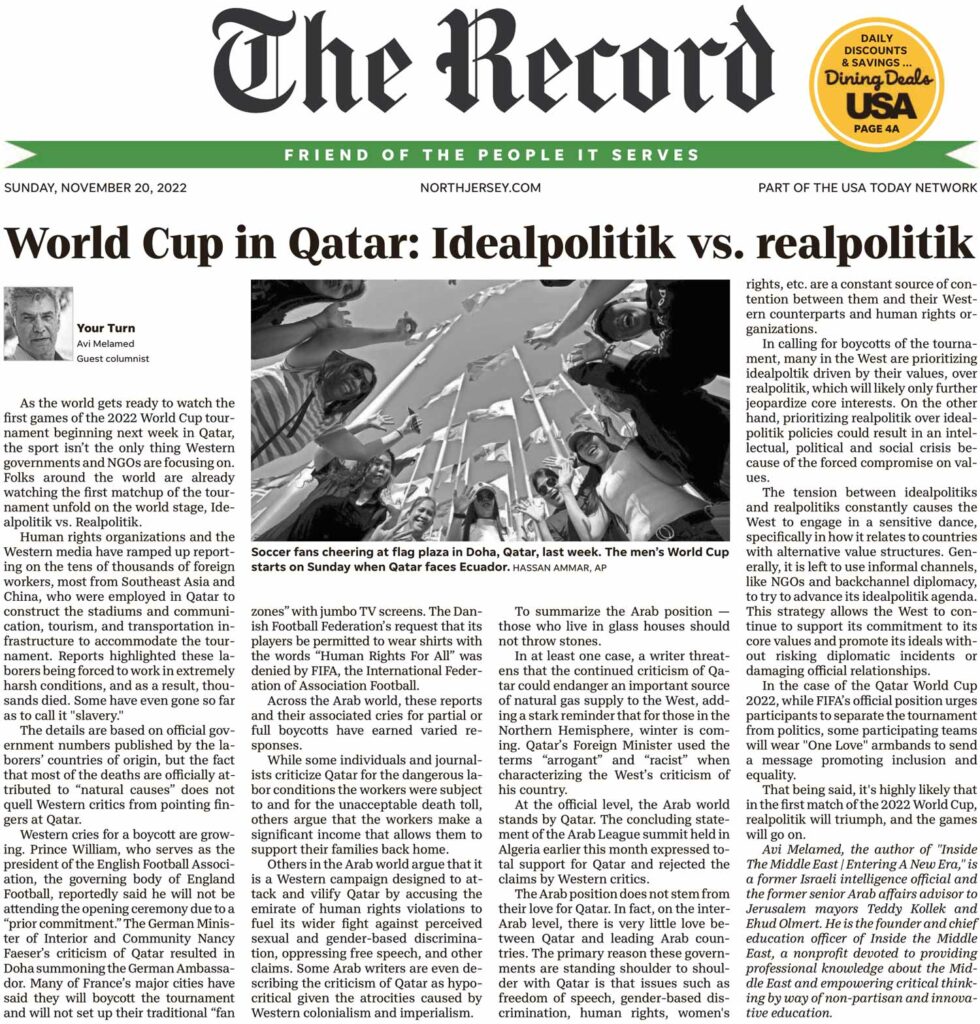|
Getting your Trinity Audio player ready...
|
At the 2022 World Cup in Qatar, the title match is idealpolitik vs realpolitik Originally published in USA Today | 2022 November 18 issue as well as in more that 100 newspapers (online & print) all over the USA.
As the world gets ready to watch the first games of the 2022 World Cup tournament beginning next week in Qatar, the sport isn’t the only thing Western governments and NGOs are focusing on. Folks around the world are already watching the first matchup of the tournament unfold on the world stage, Idealpolitik vs. Realpolitik.
Human rights organizations and the Western media have ramped up reporting on the tens of thousands of foreign workers, most from Southeast Asia and China, who were employed in Qatar to construct the stadiums and communication, tourism, and transportation infrastructure to accommodate the tournament. Reports highlighted these laborers being forced to work in extremely harsh conditions, and as a result, thousands died. Some have even gone so far as to call it “slavery.”
The details are based on official government numbers published by the laborers’ countries of origin, but the fact that most of the deaths are officially attributed to “natural causes” does not quell Western critics from pointing fingers at Qatar.
Western cries for a boycott are growing. Prince William, who serves as the president of the English Football Association, the governing body of England Football, reportedly said he will not be attending the opening ceremony due to a “prior commitment.” The German Minister of Interior and Community Nancy Faeser’s criticism of Qatar resulted in Doha summoning the German Ambassador. Many of France’s major cities have said they will boycott the tournament and will not set up their traditional “fan zones” with jumbo TV screens. The Danish Football Federation’s request that its players be permitted to wear shirts with the words “Human Rights For All” was denied by FIFA, the International Federation of Association Football.
Across the Arab world, these reports and their associated cries for partial or full boycotts have earned varied responses.
While some individuals and journalists criticize Qatar for the dangerous labor conditions the workers were subject to and for the unacceptable death toll, others argue that the workers make a significant income that allows them to support their families back home.
Others in the Arab world argue that it is a Western campaign designed to attack and vilify Qatar by accusing the emirate of human rights violations to fuel its wider fight against perceived sexual and gender-based discrimination, oppressing free speech, and other claims. Some Arab writers are even describing the criticism of Qatar as hypocritical given the atrocities caused by Western colonialism and imperialism.
To summarize the Arab position — those who live in glass houses should not throw stones.
In at least one case, a writer threatens that the continued criticism of Qatar could endanger an important source of natural gas supply to the West, adding a stark reminder that for those in the Northern Hemisphere, winter is coming. Qatar’s Foreign Minister used the terms “arrogant” and “racist” when characterizing the West’s criticism of his country.
At the official level, the Arab world stands by Qatar. The concluding statement of the Arab League summit held in Algeria earlier this month expressed total support for Qatar and rejected the claims by Western critics.
The Arab position does not stem from their love for Qatar. In fact, on the inter-Arab level, there is very little love between Qatar and leading Arab countries. The primary reason these governments are standing shoulder to shoulder with Qatar is that issues such as freedom of speech, gender-based discrimination, human rights, women’s rights, etc. are a constant source of contention between them and their Western counterparts and human rights organizations.
In calling for boycotts of the tournament, many in the West are prioritizing idealpoltik driven by their values, over realpolitik, which will likely only further jeopardize core interests. On the other hand, prioritizing realpolitik over idealpolitik policies could result in an intellectual, political and social crisis because of the forced compromise on values.
The tension between idealpolitiks and realpolitiks constantly causes the West to engage in a sensitive dance, specifically in how it relates to countries with alternative value structures. Generally, it is left to use informal channels, like NGOs and backchannel diplomacy, to try to advance its idealpolitik agenda. This strategy allows the West to continue to support its commitment to its core values and promote its ideals without risking diplomatic incidents or damaging official relationships.
In the case of the Qatar World Cup 2022, while FIFA’s official position urges participants to separate the tournament from politics, some participating teams will wear “One Love” armbands to send a message promoting inclusion and equality.
That being said, it’s highly likely that in the first match of the 2022 World Cup, idealpolitik vs. realpolitik, realpolitik will triumph, and the games will go on.

At the 2022 World Cup in Qatar, the title match is idealpolitik vs. realpolitik Originally published in USA Today | 2022 November 18 issue as well as in more that 100 newspapers (online & print) all over the USA
































































